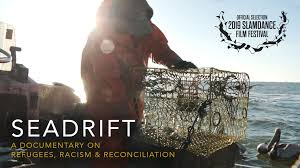|
They’re taking our jobs. They’re changing our community. They’re importing their diseases. They don’t speak English. Sound familiar? Welcome to Seadrift, Texas, a Gulf Coast fishing town where tensions between a burgeoning Vietnamese refugee population clashed violently in a white-dominated community suffering with a struggling economy. On November 15, a new critically-acclaimed documentary aptly titled Seadrift, which was co-produced by MiraCosta College sociology Professor Thao Ha, will be screened at the Oceanside Campus Concert Hall. Ha will discuss the backdrop of what happened in Seadrift before the 68-minute film is shown, and a question-and-answer session will follow. “Yes, the people who see the movie will come away learning about and appreciating the story of the Vietnamese community in Seadrift, but just as important are its universal themes of the human experience,” said Ha.
There is no charge for this event that is open to the public and is part of MiraCosta College’s ongoing International Film Series. Ha and director Tim Tsai spent seven years developing the project, which included securing grants and other funding, engaging in a bounty of archival research, conducting lengthy conversations and interviews with residents of Seadrift who share their stories, translating numerous interviews conducted in Vietnamese, film editing and more. Seadrift debuted in January at the Slamdance Film Festival in Park City, Utah. It captured Best Documentary Feature at the Indie Foreign Film Festival in New York in October, and was also presented with the Migrant Center Award for best film reflecting the mission of The Migrant Center of New York, which sponsors the festival. “It was a long process to get this done,” Ha said. Seadrift evolved from the 2008 collection of writings called “Asian Texans: Our Histories and Our Lives” by Irwin Tang. Included in the groundbreaking work is Ha’s chapter, “The Vietnamese Texans,” which expanded upon her doctoral thesis at the University of Texas and detailed the story of the tensions, violence and aftermath in the sleepy coastal fishing town. Tsai contacted Ha after reading the work. A partnership was born and the project was launched shortly thereafter. Ha was among the more than 100,000 South Vietnamese refugees who fled to the United States after the fall of Saigon to the North Vietnamese Army in 1975. She was two. Her father, a pilot in the South Vietnamese air force, and her mother fled the war-ravaged country aboard a C-130 Hercules transport plane to Eglin Air Force Base on the Florida panhandle before settling in Houston. The reception they found there was far from welcoming. The growing Vietnamese community faced the same sort of reception immigrants of all kinds have found throughout U.S. history: bigotry and fear spiced with discrimination, racial epithets, and ethnic slurs. Her doctoral dissertation, “Immigrant Business and the Racialization of Work: A Tale of Two Niches in Texas’ Vietnamese Communities,” detailed the tensions Vietnamese in the fishing and aquaculture industries, tensions that exploded in violent confrontations between Vietnamese and white shrimpers in Seadrift that culminated with the fatal shooting of a white crab fisherman. The fallout was predictable: Vietnamese boats and homes set afire. The Ku Klux Klan was called in. Intimidation flourished. Vietnamese were told to go back home. Racism raged. Many argued it was time for white people to reclaim this country. According to Ha, Seadrift attracted such a large Vietnamese population after the owner of a crab processing plant in Maryland arrived in Texas to expand his operations and began hiring Vietnamese families to work at the site. Chain migration followed. Before long, a number of Vietnamese, doing what they had been doing for generations in their homeland, took to the seas in their own fishing vessels. Territorial squabbles ensued, contributing to the rising tensions. Seadrift is being screened at MiraCosta College just four days after a showing at the San Diego Asian Film Festival. The November 15 event begins at 7 p.m. MiraCosta College is at 1 Barnard Drive, Oceanside, CA 92056. About MiraCosta College The MiraCosta Community College District has served the coastal North San Diego County area for over 80 years. More than 21,000 credit students per semester in over 70 disciplines enroll in associate degrees, university transfer and workforce readiness certificate programs. The college also serves a wide spectrum of educational needs in the region ranging from programs for adult education, basic skills, and ESL to a California Community College pilot program offering the nation’s first baccalaureate degree in biomanufacturing. MiraCosta College is accredited by the Accrediting Commission for Community and Junior Colleges (ACCJC) and the Western Association of Schools and Colleges (WASC) Comments are closed.
|
news Categories
All
RECENT NEWS
July 2024
|
|
|
|
|


 RSS Feed
RSS Feed
